
Applied Research
Introduction
The climate-changed world in which we live requires new approaches to research. Through our Applied Research initiative, we aim to provide grounded guidance for leaders who wish to meet the unique challenges of this time by leading from a place of deep intention rather than from a place of anxious reactivity.
The BTS Center’s Applied Research initiative centers the needs, knowledge, and wisdom of practitioners: the congregational clergy, laypersons leading within faith communities, and other spiritual leaders with whom we work. We believe that not only do practitioners need the support of research findings in order to better engage in their work, but also that these leaders possess invaluable wisdom that deserves to be cultivated and shared with others. Through our Applied Research, we aim to surface this wisdom in ways that help to address important questions about leading spiritual communities in a climate-changed world.
With each of our research projects, we start from a place of description and observation, attentive to the dynamics of emergence. We aim to be honest without lapsing into despair, hopeful without being optimistic, empowering while naming the very real limits of our power, and grounded in daily practice while weaving threads that connect back to the deepest roots of our story and out to the planetary issues facing us now.
Rather than embodying this emphasis solely through discrete projects, the role of the Applied Research initiative is to bring a posture of rigorous and reverent curiosity to many of the programs we lead. The data that we collect and the findings that emerge inform our own work as an organization, the work of our partners, and the work of the congregations, communities, and individuals who are seeking to embody spiritual leadership for a climate-changed world.
Our questions for investigation:
- How do spiritual leaders and faith communities understand their vocation in a climate-changed world, and how do these understandings shift over time?
- What does transformative faith leadership look like when embodied by spiritual leaders and faith communities in a climate-changed world?
- What frameworks, postures, and practices contribute to transformative faith leadership in a climate-changed world?
- What interventions cultivate these frameworks, postures, and practices in spiritual leaders and faith communities?
What do we mean by frameworks, postures, and practices?
Frameworks: The ways that people make meaning of the world around them — for example: worldview, theologies, dominant stories
Postures: The dispositions or ways of being that describe how leaders interact with the environment around them
Practices: The day-to-day habits that leaders integrate consistently into their work and model for others
Who we are doing this for:
Our Applied Research is co-productive research done for and with spiritual leaders in a climate-changed world.
How we approach this work:
We conduct this research using social science methodology, including questionnaires, focus groups, and site visits, in collaboration with other scholars and with the guidance of our Research Advisory Committee.
Our research results in:
Descriptions: Through our research, we offer evidence-based descriptions of the day-to-day realities of congregations and their engagement with a climate-changed world which help spiritual leaders better understand the contexts in which they are leading.
Pathways: Through our research, we offer evidence-based pathways for faith communities to step more deeply into transformative engagement with a climate-changed world.
We share our results with two primary audiences. The first is internal: staff, program facilitators, board members, consultants, and others who are responsible for leading The BTS Center’s programming. The second is external: constituents who are already connected with The BTS Center’s work and the general public.
How We Do Our Work
Our approach to Applied Research is unique in several ways. Please click on each to learn more about the principles that guide our work.
We bring a unique organizational perspective to this research effort, asking big questions about what this climate-changed moment is calling out of us. This includes a few assumptions, including that the climate crisis is a spiritual crisis; that the Christian tradition has a unique role to play in a climate-changed world; and that our work is to cultivate “spiritual leadership for a climate-changed world.” We choose to bring that mission and perspective to our work, rather than trying to set them to the side.
We use the word rigorous because we aim to bring the discipline of quantitative and qualitative research to our programs, asking important questions, surfacing stories, collecting data, drawing conclusions, and sharing our findings; and reverent because we understand this work is sacred — we ask curious questions not simply because we are interested, but also because there is a divine urgency, a sacred calling, to this work of cultivating and nurturing spiritual leadership for a climate-changed world.
The BTS Center’s Applied Research efforts begin with the needs, knowledge, and wisdom of practitioners — congregational clergy, laypersons leading within faith communities, and other spiritual leaders — rather than producing material that is intended for the research community or academic audiences. We believe that not only do practitioners deeply need the support of research efforts in order to better engage in their work, but also that they possess invaluable wisdom that deserves to be cultivated and shared with others.
While some of our work focuses on building conceptual frameworks — for example, making the case that the climate crisis is a spiritual crisis — much of it focuses on asking, “What do we see here?” This means that we frequently employ rigorous qualitative and quantitative research methods — intake and exit questionnaires, interviews, focus groups, and site visits, for example — as a way of ensuring that we are describing what we see with honesty, clarity, and rigor.
We are always looking for partners and collaborators who are willing to check our assumptions and offer their own wisdom. We seek cross-institutional (such as other researchers or other invested organizations), cross-sector (such as non-profit leaders, chaplains, and spiritual directors), and cross-cultural individuals, groups, and institutions as both partners and sites for our research efforts.
We believe that our programming can be a site of learning and that our constituents and facilitators have much to offer to our research efforts. Our research is rooted in specific programs, and we lean toward active co-productive, co-learning research models, where participants have a degree of control in setting the agenda, making observations, and offering conclusions.
We intentionally create space for emergence in our research, so that there is room for change, surprise, and co-creation. We take care to shape our research in ways that allow us to be proven wrong, to change the framing of our questions, and to invite new ways of understanding to emerge organically from the leaders and communities with whom we work.
What We’re Learning
Research Collaborative
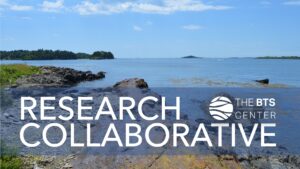
From November 2021 through November 2022, The BTS Center’s Research Collaborative gathered eight cross-sector organizations, all planted within Northern New England (plus one organization across the border in Montreal) — organizations representing many different sectors, including education, prison reform, the arts, community gardening and food justice, and social action — to explore the question “How would organizations act differently today if they embodied an ecological imagination?” The Research Collaborative took the form of a co-learning community which was nested within an in-depth qualitative research process. Together we spent a year in mutual exploration: reading together, asking big questions, sharing our experiences, wondering aloud, and engaging in personal and organizational experiments.
EcoPreacher: Compelling Preaching for a Climate-Changed World
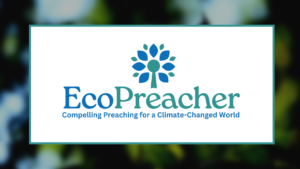
The Compelling Preaching for a Climate-Changed World research project centers on the EcoPreacher Cohort, a nine-month cohort designed to help preachers hone their craft within the context of a climate-changed world. During the pilot EcoPreacher Cohort, this research resulted in program reports, academic papers, and presentations at the Society for the Scientific Study of Religion. Research during the current EcoPreacher Cohort focuses on the program’s impact among participants and their congregations and also how a congregation’s cultural, ecological, and institutional context informs engagement with climate and care of the Earth. This research is being conducted by Ben Yosua-Davis, The BTS Center’s Director of Applied Research, and Rev. Dr. Leah Schade, Assistant Professor of Preaching and Worship at Lexington Theological Seminary, in collaboration with a team of research advisors.
Current and Ongoing Research
Claiming Your Call for a Climate-Changed World and Small Church Leadership Community
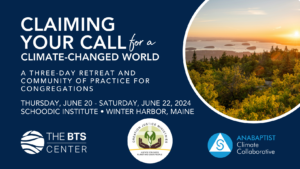
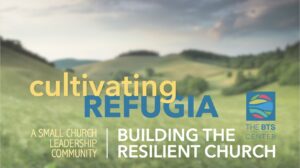 These research projects accompany cohort-based programs that are engaging teams from New England congregations. Both focus on how congregational teams understand their vocation in a climate-changed world and how their sense of vocation shifts over the course of their involvement with these programs. The research includes intake and exit questionnaires, selective field noting of gatherings, and site visits to participating churches.
These research projects accompany cohort-based programs that are engaging teams from New England congregations. Both focus on how congregational teams understand their vocation in a climate-changed world and how their sense of vocation shifts over the course of their involvement with these programs. The research includes intake and exit questionnaires, selective field noting of gatherings, and site visits to participating churches.
Meet our Director of Applied Research
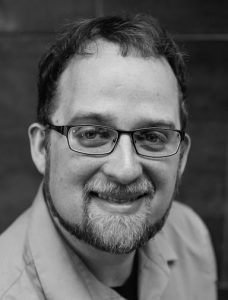 Ben Yosua-Davis serves on The BTS Center staff team as Director of Applied Research, where he shapes the organization’s posture of “rigorous and reverent curiosity,” focused on research that supports and shares the wisdom of on-the-ground practitioners working in a climate-changed world. He is a graduate of Drew Theological Seminary and Colby College.
Ben Yosua-Davis serves on The BTS Center staff team as Director of Applied Research, where he shapes the organization’s posture of “rigorous and reverent curiosity,” focused on research that supports and shares the wisdom of on-the-ground practitioners working in a climate-changed world. He is a graduate of Drew Theological Seminary and Colby College.
Previously, he lived in Haverhill, MA, where he co-planted a new church called The Vine, one of the earliest mainline missional church expressions in the country, and hosted a podcast entitled, “Reports From the Spiritual Frontier,” which chronicled the day-to-day lives of leaders innovating new forms of spiritual community.
Ben is a Maine native and now lives on Chebeague Island, Maine with his wife, Melissa, his son Michael, and his daughters, Genevieve and Emeline; where he directs the community chorus and delivers tins of cookies to unsuspecting neighbors.
Meet Our Research Assistant
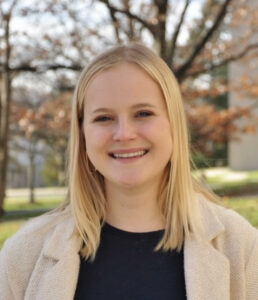 Sydney Marie Jones is a Master of Regional Planning student at Cornell University focusing on climate adaptation and landscape architecture. With backgrounds in climate change communication, climate activism, and environmental psychology, Sydney hopes to aid The BTS Center Applied Research Team in analyzing, supporting, and transforming environmental initiatives within religious communities. Her current role as an EcoPreacher Research Assistant consists of analyzing and coding congregational surveys that discuss spiritual identity and practice in a climate-changed world. Recently, Sydney co-authored and conducted survey coding for the report "Cooperative Adaptation Strategies for Affordable Housing in NYC (CASA)" which discusses the funding limitations and strategies for affordable housing co-ops in acquiring green infrastructure to prevent flood risks and damage. She aspires to pursue climate adaptive planning that is both community-driven and biocentric within her professional career.
Sydney Marie Jones is a Master of Regional Planning student at Cornell University focusing on climate adaptation and landscape architecture. With backgrounds in climate change communication, climate activism, and environmental psychology, Sydney hopes to aid The BTS Center Applied Research Team in analyzing, supporting, and transforming environmental initiatives within religious communities. Her current role as an EcoPreacher Research Assistant consists of analyzing and coding congregational surveys that discuss spiritual identity and practice in a climate-changed world. Recently, Sydney co-authored and conducted survey coding for the report "Cooperative Adaptation Strategies for Affordable Housing in NYC (CASA)" which discusses the funding limitations and strategies for affordable housing co-ops in acquiring green infrastructure to prevent flood risks and damage. She aspires to pursue climate adaptive planning that is both community-driven and biocentric within her professional career.
Meet Our Research Advisory Team
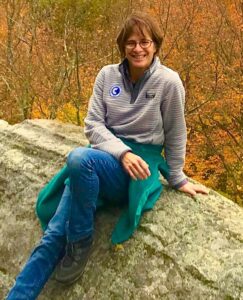 Rebecca Kneale Gould, Ph.D. — Senior Research Advisor is Associate Professor of Environmental Studies and co-director of the Philosophy, Religion and Environment focus at Middlebury College. She is delighted to be working with the BTS Center as a resident scholar, assisting with Applied Research and other programs. Rebecca is scholar of comparative religion and American religious history by training (PhD, Harvard University, 1997). Her prevailing interest is in how people make meaning for themselves, in both religious and “spiritual-but-not-religious” ways. Her book, At Home in Nature: Modern Homesteading and Spiritual Practice in America explores back-to-the-land movements as an expression of American “nature religion.” At the same time, much of her research and writing has focused on religious environmentalism, particularly the ways in which Christians and Jews of various stripes understand and negotiate the relationship between their religious identities and their ecological commitments. In addition to articles and book chapters addressing these questions, she is the co-creator, with Phil Walker, of a contemplative documentary short: The Fire Inside: Place, Passion and the Primacy of Nature. Rebecca embraces the liberal Jewish roots of her multi-religious family tree, leads a monthly women’s Hebrew chant group and is active in various interfaith spiritual direction initiatives. She has a passion for Thoreau and currently serves on the boards of the Thoreau Society and Vermont Interfaith Power and Light. She lives in Vermont with her wife and small flock of adorable rescue sheep.
Rebecca Kneale Gould, Ph.D. — Senior Research Advisor is Associate Professor of Environmental Studies and co-director of the Philosophy, Religion and Environment focus at Middlebury College. She is delighted to be working with the BTS Center as a resident scholar, assisting with Applied Research and other programs. Rebecca is scholar of comparative religion and American religious history by training (PhD, Harvard University, 1997). Her prevailing interest is in how people make meaning for themselves, in both religious and “spiritual-but-not-religious” ways. Her book, At Home in Nature: Modern Homesteading and Spiritual Practice in America explores back-to-the-land movements as an expression of American “nature religion.” At the same time, much of her research and writing has focused on religious environmentalism, particularly the ways in which Christians and Jews of various stripes understand and negotiate the relationship between their religious identities and their ecological commitments. In addition to articles and book chapters addressing these questions, she is the co-creator, with Phil Walker, of a contemplative documentary short: The Fire Inside: Place, Passion and the Primacy of Nature. Rebecca embraces the liberal Jewish roots of her multi-religious family tree, leads a monthly women’s Hebrew chant group and is active in various interfaith spiritual direction initiatives. She has a passion for Thoreau and currently serves on the boards of the Thoreau Society and Vermont Interfaith Power and Light. She lives in Vermont with her wife and small flock of adorable rescue sheep.
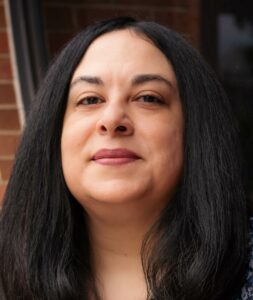 Kristina Lizardy-Hajbi, Ph.D., is Associate Professor of Leadership and Formation and Director of the Office of Professional Formation at Iliff School of Theology. In addition, she is coordinator of the Certificate in Latinx Studies for the Iliff/University of Denver Joint PhD in the Study of Religion. Kristina’s current research interests lie at the intersection of congregational leadership, community formation, and decolonial praxis, exploring questions about why and how liberative change unfolds. She is the author of Unraveling Religious Leadership: Power, Authority, and Decoloniality (Fortress, 2024) and co-editor of Explore: Vocational Discovery in Ministry (Rowman & Littlefield, 2022), as well as a regional advisor for the Exploring the Pandemic Impact on Congregations (EPIC) National Research Project. Kristina is an Ordained Minister in the United Church of Christ. Her most important work in the world, however, is being a tati (aunt) to two beautiful nephews and a partner to Ali. Kristina resides in Aurora, Colorado, on the unceded tribal lands of the Cheyenne and Ute peoples.
Kristina Lizardy-Hajbi, Ph.D., is Associate Professor of Leadership and Formation and Director of the Office of Professional Formation at Iliff School of Theology. In addition, she is coordinator of the Certificate in Latinx Studies for the Iliff/University of Denver Joint PhD in the Study of Religion. Kristina’s current research interests lie at the intersection of congregational leadership, community formation, and decolonial praxis, exploring questions about why and how liberative change unfolds. She is the author of Unraveling Religious Leadership: Power, Authority, and Decoloniality (Fortress, 2024) and co-editor of Explore: Vocational Discovery in Ministry (Rowman & Littlefield, 2022), as well as a regional advisor for the Exploring the Pandemic Impact on Congregations (EPIC) National Research Project. Kristina is an Ordained Minister in the United Church of Christ. Her most important work in the world, however, is being a tati (aunt) to two beautiful nephews and a partner to Ali. Kristina resides in Aurora, Colorado, on the unceded tribal lands of the Cheyenne and Ute peoples.
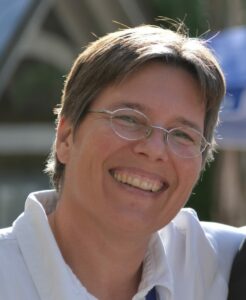
Susanne Moser, Ph.D. (she/her/hers) is a geographer (Ph.D. 1997, Clark University) who works nationally and internationally as an independent scholar and consultant from a base in western Massachusetts. Her work with government agencies, non-profits, foundations, and other researchers and consultants focuses on adaptation to climate change, science-policy interactions, effective climate change communication, and psycho-social resilience in the face of the traumatic and transformative challenges associated with climate change. Susi is the editor of two award-winning edited volumes, one on successful adaptation to climate change; the other on how to communicate climate change. She is a prolific writer, an inspiring speaker and has served on scientific advisory boards for Future Earth, the International Science Council, the US National Research Council and has contributed to the IPCC and US national climate assessments. In all of her work, she seeks to embody and enact her deepest calling and thus to serve the world and Earth community from a spiritual, soul-anchored center.
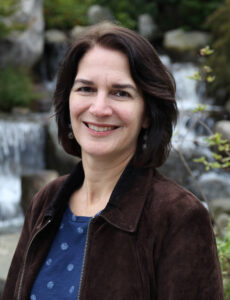 Debra Rienstra, Ph.D. is professor of English at Calvin University, where she has taught since 1996, specializing in early British literature and creative writing. She is the author of four books — on motherhood, spirituality, worship, and ecotheology / climate change — as well as numerous academic essays, literary essays, and poems. Her most recent book, Refugia Faith: Seeking Hidden Shelters, Ordinary Wonders, and the Healing of the Earth (Fortress 2022), combines theology, nature writing, and biological principles to consider how Christians must adapt our faith and practice for a climate-altered planet. Rienstra writes the fortnightly Refugia newsletter and hosts the Refugia Podcast. She also writes fortnightly for The Reformed Journal blog, writing about spirituality, pop culture, the church, the arts, higher ed, and more.
Debra Rienstra, Ph.D. is professor of English at Calvin University, where she has taught since 1996, specializing in early British literature and creative writing. She is the author of four books — on motherhood, spirituality, worship, and ecotheology / climate change — as well as numerous academic essays, literary essays, and poems. Her most recent book, Refugia Faith: Seeking Hidden Shelters, Ordinary Wonders, and the Healing of the Earth (Fortress 2022), combines theology, nature writing, and biological principles to consider how Christians must adapt our faith and practice for a climate-altered planet. Rienstra writes the fortnightly Refugia newsletter and hosts the Refugia Podcast. She also writes fortnightly for The Reformed Journal blog, writing about spirituality, pop culture, the church, the arts, higher ed, and more.
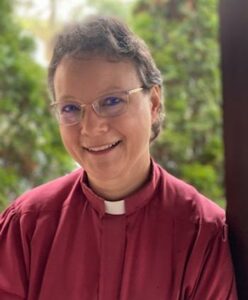 Rev. Leah D. Schade, Ph.D. is Associate Professor of Preaching and Worship at Lexington Theological Seminary in Kentucky. An ordained Lutheran minister since 2000, Leah has served congregations in rural, urban, and suburban settings. She earned both her MDiv and PhD degrees from the Lutheran Theological Seminary at Philadelphia (now United Lutheran Seminary). Her publications include: Creation-Crisis Preaching: Ecology, Theology, and the Pulpit (Chalice Press, 2015); Preaching in the Purple Zone: Ministry in the Red-Blue Divide (Rowman & Littlefield, 2019); and Rooted and Rising: Voices of Courage in a Time of Climate Crisis, co-edited with Margaret Bullitt-Jonas with essays from a cross-section of faith leaders and activists offering their spiritual wisdom and energy for facing the difficult days ahead (Rowman & Littlefield, 2019). She has also written a Creation-centered Lenten devotional, For the Beauty of the Earth (Chalice Press, 2019). Leah has served as an anti-fracking and climate activist, community organizer, and advocate for environmental justice issues and is the “EcoPreacher” blogger for Patheos.com: http://www.patheos.com/blogs/ecopreacher/. She has recently launched a partnership with the Interfaith Center for Sustainable Development to create a monthly resource called EcoPreacher 1-2-3 for busy pastors wanting to address environmental issues in their sermons.
Rev. Leah D. Schade, Ph.D. is Associate Professor of Preaching and Worship at Lexington Theological Seminary in Kentucky. An ordained Lutheran minister since 2000, Leah has served congregations in rural, urban, and suburban settings. She earned both her MDiv and PhD degrees from the Lutheran Theological Seminary at Philadelphia (now United Lutheran Seminary). Her publications include: Creation-Crisis Preaching: Ecology, Theology, and the Pulpit (Chalice Press, 2015); Preaching in the Purple Zone: Ministry in the Red-Blue Divide (Rowman & Littlefield, 2019); and Rooted and Rising: Voices of Courage in a Time of Climate Crisis, co-edited with Margaret Bullitt-Jonas with essays from a cross-section of faith leaders and activists offering their spiritual wisdom and energy for facing the difficult days ahead (Rowman & Littlefield, 2019). She has also written a Creation-centered Lenten devotional, For the Beauty of the Earth (Chalice Press, 2019). Leah has served as an anti-fracking and climate activist, community organizer, and advocate for environmental justice issues and is the “EcoPreacher” blogger for Patheos.com: http://www.patheos.com/blogs/ecopreacher/. She has recently launched a partnership with the Interfaith Center for Sustainable Development to create a monthly resource called EcoPreacher 1-2-3 for busy pastors wanting to address environmental issues in their sermons.
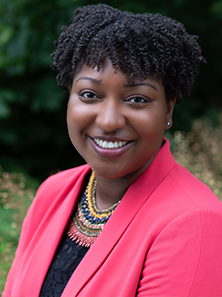 Marquisha Scott, Ph.D. is an Assistant Professor at the Graduate School of Social Work at the University of Denver. She centers her research, teaching, and community engagement on ensuring that community and religious congregations, are equipped to serve their identified communities (e.g., youth, marginalized communities). With a background in macro social work (MSW, Washington University in St. Louis; PhD in Social Welfare, University of Pennsylvania), community organizing and understanding religious congregations as organizations of faith and service (MDiv, Eden Theological Seminary), her work centers religious congregations as social problem solvers. During qualitative research with clergy in Philadelphia, the need to get climate change and ecojustice-based information and resources to local congregations and communities was a core focus for clergy. The Philadelphia-based interviews led to additional research in assessing what clergy and congregations across the United States are doing to bring climate work to the local level. The work with the BTS Center and EcoPreacher is another layer of evidence building to support congregations in bringing climate and environmentally-focused resources to religious congregations. Marquisha is also a collaborator at the Center for Religion and Cities (Baltimore, MD). She travels, goes on long walks, reads, and enjoys life with her husband and daughter.
Marquisha Scott, Ph.D. is an Assistant Professor at the Graduate School of Social Work at the University of Denver. She centers her research, teaching, and community engagement on ensuring that community and religious congregations, are equipped to serve their identified communities (e.g., youth, marginalized communities). With a background in macro social work (MSW, Washington University in St. Louis; PhD in Social Welfare, University of Pennsylvania), community organizing and understanding religious congregations as organizations of faith and service (MDiv, Eden Theological Seminary), her work centers religious congregations as social problem solvers. During qualitative research with clergy in Philadelphia, the need to get climate change and ecojustice-based information and resources to local congregations and communities was a core focus for clergy. The Philadelphia-based interviews led to additional research in assessing what clergy and congregations across the United States are doing to bring climate work to the local level. The work with the BTS Center and EcoPreacher is another layer of evidence building to support congregations in bringing climate and environmentally-focused resources to religious congregations. Marquisha is also a collaborator at the Center for Religion and Cities (Baltimore, MD). She travels, goes on long walks, reads, and enjoys life with her husband and daughter.
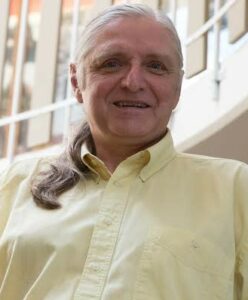 Wayne Luther Thompson, Ph.D. is Distinguished Professor Emeritus, Sociology at Carthage College and adjunct professor at Concordia University Wisconsin and Ann Arbor. His doctorate is from University of Connecticut (1991). Professor Thompson's research interests and publications center around congregations, clergy studies, suicide and religion, and human responses to climate change. He also conducts poverty simulations for academic and community based organizations. He is President of the Wisconsin Sociological Association (2024-2025).
Wayne Luther Thompson, Ph.D. is Distinguished Professor Emeritus, Sociology at Carthage College and adjunct professor at Concordia University Wisconsin and Ann Arbor. His doctorate is from University of Connecticut (1991). Professor Thompson's research interests and publications center around congregations, clergy studies, suicide and religion, and human responses to climate change. He also conducts poverty simulations for academic and community based organizations. He is President of the Wisconsin Sociological Association (2024-2025).
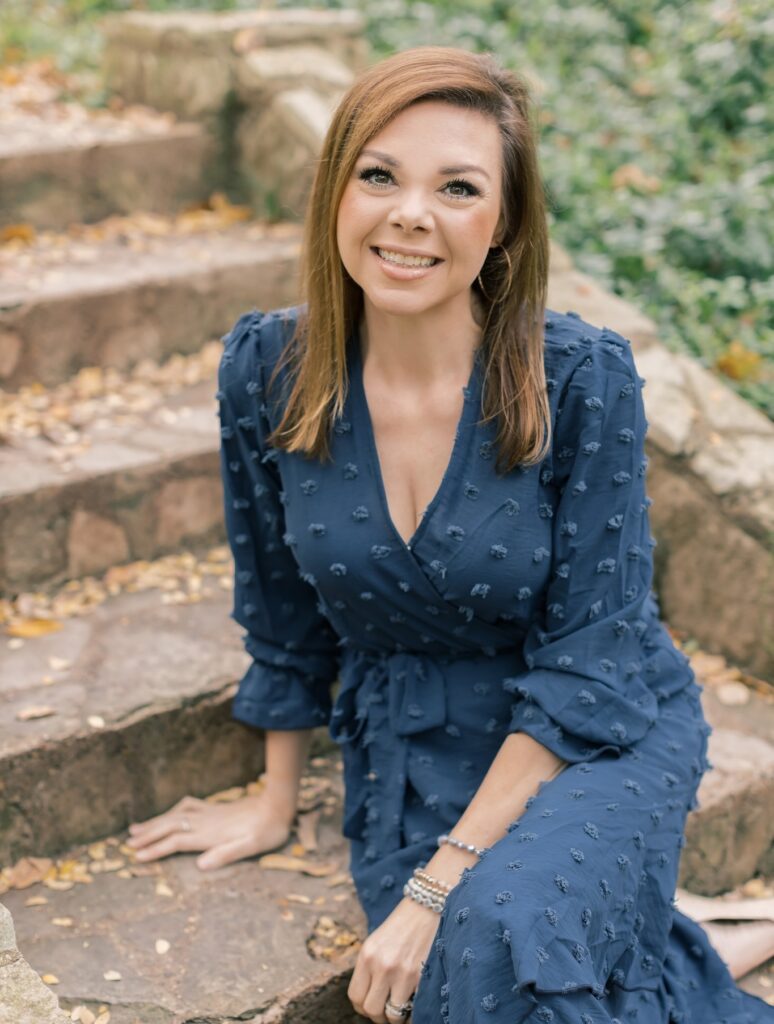
Amanda Wilson Harper, Ph.D. (she/her/hers) is an LCSW (Ph.D. 2020, Baylor University) who works as an Assistant Professor, and nationally as an research consultant from a base in North Central Texas. Her work with non-profits, congregations, denominations and other researchers and consultants focuses on congregational engagement in social justice issues, including environmental issues.

